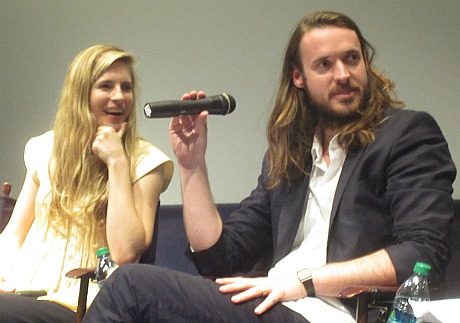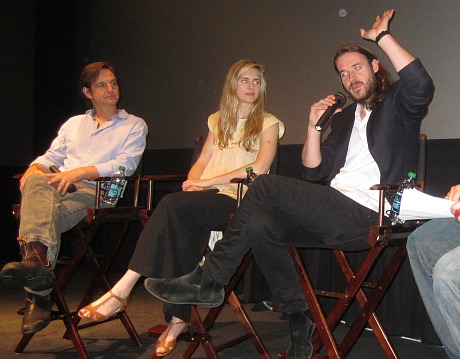Last night I finally saw Mike Cahill and Brit Marling‘s Another Earth (Fox Searchlight, 7.22), a spare but imaginative low-budgeter about loss and recovery and redemption. It’s partly a sci-fi fantasy about the approach of a second earth, but you’re supposed to let that go and focus on the meaning of Earth #2 — a 99% duplicate of our own world — and the escape it offers to people who are unhappy and “want out.”

Another Earth star, co-writer and co-producer Britt Marling, and director, co-writer and editor Mike Cahill following last night’s screening at the Landmark.

(l. to r.) William Mapother, Marling, Cahill.
Marling plays Rhoda, a high-school grad whose plan to attend MIT is destroyed when she absent-mindedly and somewhat drunkenly crashes her car into another. The impact kills a mother and child, and sends the father (William Mapother), named John, into a coma. Rhoda goes to prison for manslaughter and is released four years later. Numbed by guilt and unable to get her life rolling, she takes a job as a high-school janitor. When Rhoda learns that John has come out of his coma, she pretends to be a cleaning-service rep in order to clean up his skanky home (he’s been despondent and drinking) and make herself feel better by brightening his life a bit.
And all the while Earth #2 is up in the sky, moving closer and closer. Voice contact is eventually established and people realize that every last person, personality, car, seagull, cat, dog, continent and iPhone has an exact double on the approaching planet, but also that certain things may be a little different. Rhoda enters a contest that, if she wins, will give her free passage to Earth #2, where — perhaps — her double hasn’t killed anyone in a car crash. But at the same time she’s happy with John by making him feel better and less depressed. He, meanwhile, is starting to fall in love with her, and tries to get her to change her mind about travelling to Earth #2 if and when she’s lucky enough to win.
Yes, it sounds far-fetched and insufficiently worked out, and probably beyond the grasp of a mini-budget indie. But Another Earth works regardless because it’s reasonably well crafted and comfortable with being small-scale, and because Cahill and Marling let you know just enough to float the story and no more. The lack of detail works in its favor to some extent. And it’s short. And it’s convinclngly acted by Marling, a young Meryl Streep-meets-Jennifer Warren type whose eyes are almost exactly like the eyes of a girlfriend I had a long time ago, and by Mapother, and that’s more or less okay as far as it goes. And it ends well.
But it has two problems.
One, Earth #2 gets bigger and bigger as the story moves along and Cahill-Marling don’t explain what’s actually going on, scientifically speaking. Two months ago Cannes journalists saw Lars Von Trier‘s Melancholia, which is nominally about another planet crashing into the earth, and I for one couldn’t stop thinking about this and Earth‘s similar shots of an approaching planet. There’s no talk about obliteration, but Earth #2 is heading straight for our own and nobody explains that it’s going to pass us by. Even big-metaphor movies can’t ignore the science altogether. Sometimes you can under-explain things too much.
Don’t even talk about the tidal-gravity affects of a huge planet coming this close, etc.
The second problem is Mapother, who doesn’t have the face or the manner of a guy you can relax with and relate to. There’s a reason why certain actors become movie stars, and that’s because they’re attractive and likable and cool to hang with, and whom we can accept as stand-ins for ourselves. And the truth is that there’s something faintly demonic in Mapother, who has previously played bad guys — most notably in Lost and in Todd Field‘s In The Bedroom — for a reason. He’s a bright and likable fellow in person but he creeps you out in close-ups with that demented face and those warlock eyes, and it just feels wrong for Marling to fall in love with him, and it feels a bit scary when he loses his temper two or three times during the story because you believe it all too completely.
I did what I could do settle into the film being about rebuilding a ruined life and finding the strength to forgive and move on. I managed to do that for the most part, but it would have been a smoother, more absorbing experience if someone besides Mapother had been cast. Sorry, but I couldn’t get down with him.









